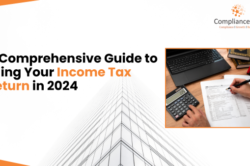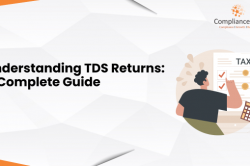Some of our
latest news
We believe in a philosophy that “alone we can go Fast but together we can go Far”. ComplianceShip strives to help the people of the society to understand the complexity of the laws in easy and simplified manner
Filing your income tax return (ITR) can seem daunting, but it’s a vital task for ensuring your financial health and compliance with Indian law. Whether you are a salaried employee, a freelancer, or a business owner, understanding the process and doing it correctly is crucial. Here's a detailed, step-by-step guide to help you file your income tax return in India in 2024. Step 1: Understand Your Income Sources The first step in filing your ITR is to identify all your income sources. Indian tax laws classify income into five main heads: Salary Income: This includes your basic salary, allowances and any other perks from your employer. Income from House Property: Earnings from renting out property or housing loans. Profits and Gains from Business or Profession: If you’re self-employed, a freelancer, or run a business. Capital Gains: Profits from selling assets like stocks, mutual funds, or real estate. Income from Other Sources: Includes interest from savings accounts, fixed deposits, dividends, etc. Taking the time to correctly identify and classify your income can make the entire filing process easier. Step 2: Gather Essential Documents Having all the necessary documents handy before you start will save time and prevent errors. Here are the key documents you’ll need: Form 16: This form, provided by your employer, details your salary and the tax deducted at source (TDS). Form 16A/16B/16C: TDS certificates for income other than salary. Form 26AS: An annual tax statement that consolidates all tax-related information. Bank Statements: To track your interest income and other transactions. Investment Proofs: Documents related to tax-saving investments (like PPF, NSC, ELSS). Loan Statements: For claiming deductions on home loan interest and principal repayment. Capital Gains Statements: For calculating capital gains tax. Other Relevant Documents: Any other documents supporting your income or deductions. Step 3: Choose the Right ITR Form Selecting the appropriate ITR form is crucial. The form you choose depends on your income sources and taxpayer category: ITR-1 (Sahaj): For individuals with income up to ₹50 lakh from salary, one house property, and other sources. ITR-2: For individuals and HUFs (Hindu Undivided Families) who do not have income from business or profession. ITR-3: For individuals and HUFs with income from a proprietary business or profession. ITR-4 (Sugam): For individuals, HUFs and firms (other than LLP) opting for the presumptive income scheme. ITR-5: For partnership firms, LLPs, associations of persons (AOP) and bodies of individuals (BOI). ITR-6: For companies other than those claiming exemption under Section 11. ITR-7: For persons including companies required to furnish returns under specific sections like charitable trusts. Step 4: Register/Login to the Income Tax e-Filing Portal Visit the Income Tax Department’s e-filing portal (https://www.incometax.gov.in/iec/foportal) and either register if you’re a new user or login if you already have an account. Ensure your profile is up-to-date with the correct email address and mobile number for communication. Step 5: Download Form 26AS Form 26AS is your consolidated tax statement. It includes details of all taxes deposited against your PAN. Verify it carefully to ensure all [...]
Understanding TDS Returns: A Complete Guide Introduction Tax Deducted at Source (TDS) is a critical component of India's tax framework, ensuring that taxes are collected at the source of income itself. Understanding and complying with TDS regulations is essential for both individuals and businesses to avoid penalties and ensure smooth tax operations. In this guide, we will delve into the intricacies of TDS returns, providing a comprehensive overview of the legal framework, filing procedures and best practices for compliance. Legal Framework: Understanding TDS Laws in India TDS laws in India are governed by the Income Tax Act of 1961 and the Income Tax Rules of 1962. These laws mandate the deduction of taxes at the source of income to ensure revenue collection for the government. Various sections of the Income Tax Act specify the rates and conditions for TDS deduction, covering a wide range of income sources. Obligations of Deductors and Deductees Deductors, individuals or entities responsible for deducting TDS, have certain obligations under the law. They must deduct the appropriate amount of tax at the prescribed rates and deposit it with the government within the specified timelines. Deductees, on the other hand are required to provide accurate information to the deductor and ensure that TDS is correctly deducted from their income. Types of TDS Returns There are different types of TDS returns based on the nature of income and the status of the deductee: Form 24Q: TDS on Salary Form 26Q: TDS on Payments Other Than Salary Form 27Q: TDS on Payments to Non-Residents Form 27EQ: TCS (Tax Collected at Source) Each form has specific requirements and deadlines for filing, depending on the nature and quantum of transactions. Due Dates for Filing TDS Return Quarter endingTDS Return Due Date (FY 2024-25)30th June 202431st July 202430th September 202431st October 202431st December 202431st January 202531st March 202531st May 2025 Understanding TDS Return Forms TDS return forms, such as Form 24Q, 26Q, 27Q and 27EQ have various components and sections that require detailed information about deductors, deductees and transaction details. Understanding the instructions for filling out each form accurately is essential to ensure compliance with tax laws. TDS Rates and Thresholds TDS Rate Chart for FY 2024-25SectionNature of PaymentThreshold (Rs.)Individual / HUF TDS Rates (%)OthersTDS Rate (%)192SalariesRs. 2,50,000Slab RatesSlab Rates192APremature EPF withdrawal*Rs. 50,00010%10%193– TDS on interest on securities***Rs. 10,00010%10%194Payment of dividendRs. 5,00010%10%194AInterest issued by banks or post offices on depositsRs. 40,000Rs. 50,000 (For senior citizens)10%10%194AInterest by others apart from on securitiesRs. 5,00010%10%194BAmounts that someone has won through lotteries, puzzles, or gamesAggregate of Rs. 10,000**30%30%194BBAmounts that someone has won from horse racesRs. 10,00030%30%194CPayments to contractor or sub-contractor – Single PaymentsRs. 30,0001%2%194CPayments to contractor/sub-contractor – Aggregate PaymentsRs. 1,00,0001%2%194DPayment of insurance commission to domestic companiesRs. 15,000NA10%194DPayment of insurance commission to companies other than domestic onesRs. 15,0005%NA194DAMaturity of Life Insurance PolicyRs. 1,00,0005%5%194EEPayment of an amount standing to the credit of an individual under NSS (National Savings Scheme)Rs. 250010%10%194FPayment of repurchase of unit by UTI (Unit Trust of India) or any mutual fundNo Limit20%20%194GPayments or commission on [...]
LLP Modified Settlement Scheme, 2020 The Ministry of Corporate Affairs introduced a settlement scheme for Limited Liability Partnership (LLP) to allow the delayed filing of forms with an additional fee limit capped at Rs. 5,000/-, effective from 16th March 2020 until 13th June 2020. The scheme aimed to promote compliance among LLPs who failed to file the form within due time and provide a one-time opportunity to complete pending compliances with lower fees. However, the Ministry of Corporate Affairs introduced a new LLP Modified Settlement Scheme, 2020 (LMSS, 2020) to modify the existing settlement scheme, allowing completion of due compliances until 31st August 2020 without payment of an additional fee, providing a boon in the Covid-19 pandemic situation for LLPs to complete all their charges without paying any additional fees and waiver of per day penalty. This is an excellent endeavor by the Central Government to promote the completion of all pending compliances by LLPs at normal fees. So, let's understand the pros and cons of the boon LMSS 2020 as provided by the Government: Eligibility Criteria The LLP Modified Scheme is applicable to all Defaulting LLPs. Defaulting LLP means all LLP who has made default in filing forms. In other words, forms are due for filing but have not been filed by the LLP. However, such forms can only be filed by the LLP only if the status of the LLP is active at the MCA portal. The following LLP cannot avail of the benefit of the LLP Settlement Scheme unless their status is changed to active: LLP under the process of striking off LLP Struck off /Defunct LLP LLP which has filled Form 24 for striking off its name Which forms can be filed The following forms which are due by 31.08.2020 and have not been filed by the LLP can be filed under the LLP Modified Settlement Scheme: Form-3: Filing of new/modified LLP Agreement Form-4: Filing of notice for appointment/resignation/change in designation of Designated Partner / Partner or consent to become Designated Partner / Partner Form-5: Notice for change in name Form-8: Filing of Statement of Accounts and Solvency Form-11: Annual Return of LLP Form-12: Intimation of Address for Service of Documents Form-15: Change of Registered office Form-22: Filing of Order of Court/ Tribunal/ CLB/ Central Government Form-23: Application for direction to Limited Liability Partnership (LLP) to change its name Form-27: Form for filing of registration of particulars by foreign LLP Form-29: Form to be filed by Foreign LLP Form-31: Application for compounding of Offence Payment of Fees The person availing benefit under the scheme is required to make payment of only normal fees. No additional fee or penalty shall be levied for all forms due by 31st August 2020, and the same has been filed on or before 30th September 2020. Immunity Certificate Every LLP filing form till 30th September 2020 will automatically be covered under the LLP Modified Settlement Scheme, and no indemnity bond is required to be filed for avail immunity under LMSS. Benefits [...]
Introduction of Corporate Social Responsibility (CSR) and COVID -19 Corporate Social Responsibility (CSR) is the social responsibility entrusted on the corporates pursuant to their availing the benefits of the society and it is the duty of the corporates to give back and protect the society through CSR activities. COVID-19 also known as corona virus disease, is pandemic declared by the World Health Organization and this virus has affected the whole world. To combat with the situation and to manage the whole country, many schemes and facilitation has been introduced by the Indian Government. However, the Government is also seeking help from corporates and individual to contribute to the extent they can to overcome this difficult situation. To promote and motivate contribution from corporate sectors government has considered their contribution as CSR Activities. Earlier CSR activities included the following: Projects or programs relating to activities areas or subjects specified in Schedule VII to the Act; or Projects or programs relating to activities undertaken by the Board of Directors of a company (Board) in pursuance of recommendations of the CSR Committee of the Board as per declared CSR Policy of the company subject to the condition that such policy will include activities, areas or subjects specified in Schedule VII of the Act. The following activities are considered as CSR activities per Schedule VII: Eradicating poverty and malnutrition, hunger, promoting health care including preventive health care and sanitation including contribution to the Swach Bharat Kosh set-up by the Central Government for the promotion of sanitation and making available safe drinking water. Promoting education, including special education and employment enhancing vocation skills especially among children, women, elderly and the differently abled and livelihood enhancement projects. Promoting gender equality, empowering women, setting up old age homes, day care centres and such other facilities for senior citizens, setting up homes and hostels for women and orphans and measures for reducing inequalities faced by socially and economically backward groups. Ensuring ecological balance, environmental sustainability, protection of flora and fauna, animal welfare, agroforestry, conservation of natural resources and maintaining quality of soil, air and water including contribution to the Clean Ganga Fund set-up by the Central Government for rejuvenation of river Ganga. Protection of art, culture and national heritage including restoration of buildings and sites of historical importance and works of art; setting up public libraries; promotion and development of traditional art and handicrafts; Measures for the benefit of war widow, armed forces veterans and their dependents; Training to promote nationally recognised sports, rural sports, paralympic sports and olympic sports Contribution to the prime minister's national relief fund or any other fund set up by the central govt. for socio economic development and relief and welfare of the schedule caste, tribes, other backward classes, minorities and women; Contribution to incubators funded by Central Government or State Government or any agency or Public Sector Undertaking of Central Government or State Government, and contributions to public funded Universities, Indian Institute of Technology (IITs), National Laboratories and Autonomous Bodies (established under [...]
CONVERSION OF A PUBLIC LIMITED COMPANY INTO A PRIVATE LIMITED COMPANY Many times there are circumstances which drive a Company to convert its nature from public to private. These circumstances may be such as favorable exemption provided to a private company or the business need or may be the market situation. So, let us discuss the detailed procedure for conversion of public company into private. POWERS DELEGATED TO RD: By Companies (Amendment) Ordinance, 2018, Power of Tribunal has been transferred to Central Government. Ministry of Corporate Affairs (MCA) on 18th December, 2018 has published Companies (Incorporation) Fourth Amendment Rules, 2018 which shall come into effect from 18th December, 2018. By these rules, MCA amended Rule 41 “applicability under Section 14 for conversion of Public Company into Private Company” wherein “Power of Central Government has been assigned to Regional Director to look into the matter related to approval of conversion of public limited company into private limited company”. PROVISION DEALING WITH CONVERSION OF PUBLIC LIMITED INTO PRIVATE LIMITED: Section 13: Deals with alteration of Memorandum of Association. Section 14: It provides for alteration of Articles of Association. Section 18: It provides the manner in which an existing Company can convert itself as a company of other class under this Act by alteration of memorandum and articles of the company in accordance with the provision of chapter II of the Act. Rule 41 of Companies (Incorporation) Fourth Amendment Rules, 2018: Rule 41 deals with Application to be filed under Section 14 for conversion of public company into private company. PROCEDURE FOR CONVERSION OF A PUBLIC COMPANY TO PRIVATE LIMITED COMPANY: STEP-I: CONVENE BOARD MEETING The very first step is to convene Board Meeting for passing of Board resolution to get in principal approval of Directors for conversion and to convene Extra Ordinary General meeting to take approval for conversion from the shareholder of the Company. Points to be considered for convening of Board Meeting: Clear 7 days notice along with agenda and notes is to be circulated among the Directors of the Company. Board Meeting can be held at a shorter notice, provided shorter consent is obtained from the Director before the meeting. Agenda and notes to be circulated among the Board Members much in advance. Notice of meeting should clearly mention the day, date, place and time of meeting. STEP –II: MATTERS TO BE CONSIDERED IN BOARD MEETING: To take in-principal approval for conversion of Public Company into Private Company. To obtain approval for Alteration in Memorandum and Articles of Association and recommend the proposal for conversion to be considered by way of special resolution by the members in general meeting To finalise the date, time, and venue of the general meeting and authorizing a director or any other person to send the notice for the same to the members. To approve General Meeting Notice along with explanatory statement to be annexed with notice as per Section 102(1) of the Act. STEP- III: ISSUE NOTICE OF GENERAL MEETING Notice of General Meeting shall be circulated at least 21 days before the actual date [...]
Registration under ESI
All about Companies Fresh Start Scheme, 2020 The impact of COVID-19 is dangerous as the virus is easily communicable and there is no specific antidote for the same. Government is trying their best to protect the interest of people to the extent they can. With this intent, they have introduced the Companies Fresh Start Scheme, 2020 (CFSS-2020) which provide a one time opportunity to all non compliant companies to start a fresh and complete their compliances without payment of additional fees. The detailed about the scheme introduced is as follows: Definitions Default: Default means failure in filing of documents on due date and are still pending for filing (also referred as belated filing). Defaulting Companies: Defaulting Companies means a Company which has made the default of non-filing of documents Inactive Companies: Inactive Companies means a company which has not been carrying on any business or operation, or has not made any significant accounting transaction during the last two financial years, or has not filed financial statements and annual returns during the last two financial years Immunity Certificate: Immunity Certificate is the certificate issued by the Designated Authority (herein reffered to Registrar of Companies) on the basis of completion of filing of belated documents and declaration made in E-form CFSS-2020. Duration of the Scheme The scheme shall be in effect from 01.04.2020 till 30.09.2020. Applicability of the Scheme Any company which failed to comply any of the compliances on any given date with respect to filing of documents, statement, returns etc. with MCA-21 registry and the same is still pending to be filed can complete their compliances within the effective period of the scheme with normal fees. No additional fee will be levied on completion of such filing with the MCA-21 registry. Further note that the immunity with respect to prosecution or proceeding shall be provided with respect to the belated filings only. Any other consequential proceedings or violation of Companies Act, 2013 and amendment thereof shall not be covered under this immunity. Manner of filing Every defaulting company can file belated documents with normal fees. The belated documents include all types of documents related to general compliances, annual compliances, Active Compliances and all other compliances except increase in authorised share capital and charge related documents. After closure of this Scheme, an application for seeking immunity certificate shall be filed in E-form CFSS-2020 and after the documents are taken on file/ record/ approved by the Registrar of Companies but not after 6 months from the closure of the Scheme. The Registrar of Companies (ROC) shall grant the immunity certificate based on the declaration made under Eform CFSS-2020. No fee shall be paid for filing of E-form CFSS-2020 for obtaining the immunity certificate. Further, this certificate shall not be applicable in the matter of any appeal or management disputes pending before the court of law. The companies which are inactive while filing their documents under CFSS, 2020 can simultaneously apply for striking off or seek for dormant status. Forms Covered under the [...]
INTRODUCTION Spice+ is another great move initiated by the Government of India to promote Ease of Doing Business in India. For the first time, the Government is providing an integrated service wherein 10 services is being provided by the Three Government Department simultaneously while incorporating a Company. This will not only save the time involved in getting all types of registration but will also help to reduce the cost burden of the Company. Further, this will also help the Company to open the bank account with much ease and comfort. All you need to know about Spice+ to be active from 15.02.2020 Spice+ web based form will integrate the service of the following government departments i.e. i) Ministry of Corporate Affairs ii) Ministry of Labour & Employment iii) Department of Revenue in the Ministry of Finance and iv) One State Govt. (Maharashtra) The Spice+ form is divided in two parts: a. Part A for reservation of name (which can be filed independently or together with Part B) b. Part B for incorporation of Company with Allotment of DIN to the Directors of the Company Mandatory issue of PAN and TAN of the Company Allotment of GSTIN only if applied at the time of incorporation Mandatory issue of EPFO and ESIC registration (Earlier it was optional) Mandatory issue of Professional Tax Registration in the state of Maharashtra (New Service) Mandatory opening of Bank Account (New service) FEATURES OF SPICE+ FORM The Spice+ form is a web based integrated form which will facilitate On-screen filing and real time data validation for seamless incorporation of companies. Features of the new Spice+ is as follows: > The facility of filing Spice+ will be available w.e.f. 15th February, 2020 on the Dashboard with other linked form as applicable. > Spice+ will be linked with other forms in form of various Sections to facilitate the User for smooth incorporation of Companies. The linked form includes the following forms: E-MOA E-AOA AGILE AGILE-PRO (for opening of Bank Account) URC1 (in case of conversion of unregistered companies) INC-9 (Declaration by Subscriber and First directors to be auto generated in pdf and submitted in electronic form only) * Applicable where the number Subscribers and/or Directors is up to 20 and/or * Subscribers and/or Directors have either PAN or DIN a. For seamless execution of Spice+, Users may fill Part B in continuation of its processing of Part A application for reservation of name. The approved name will be displayed on the Dashboard and the User needs to click the approved name and continue for filing of Spice+ Form. b. A hyperlink will be available on the SRN or Application number which will enable easy filing of form in case of name reservation or new application for incorporation as well as re-submission thereof. c. Data entered in the form can be saved and modified. d. All check form and pre-scrutiny validation will happen in web based form. e. DSC will be affixed only after completion of incorporation form and conversion of [...]







